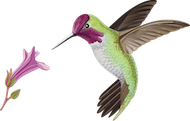Rewilding Our Urban Lands
Small birds and mammals take cover in the inner maze of a shrub thick with brambles. Black-tailed bumble bees descend on a California poppies to gather pollen. A California Scrub Jay swoops from its perch, snatching a beetle to bring back to its chicks nesting in the secure interior of a large Sugar bush. Hundreds of hummingbirds dart about, filling the air with a soft whir of sound and bright flashes of magenta, fuchsia and green as they gather at a bubbling stream to bathe.
What’s most remarkable about this scene? It isn’t happening in a state park or some remote wilderness area. It’s happening in the Gottlieb Native Garden—a California native plant home garden overlooking downtown Los Angeles, a metropolis containing almost 4,000,000 people.
Some years ago, Susan and Dan Gottlieb embarked on a journey to convert their one-acre, invasive ivy-covered property into a California native plant oasis. Today, the garden is a flourishing ecosystem with more than 200 hand-selected California native plant species and over 2000 documented wildlife species. It has the special distinction of being both a National Wildlife Federation certified Backyard Wildlife Habitat and a Xerces Society designated Pollinator Habitat. It is one of the crown jewels of the annual Theodore Payne Foundation Native Plant Garden Tour.


In addition to being a site for education, scientific research, and collaboration among a wide range of environmental groups and projects, the Gottlieb Native Garden is also a sanctuary for introspection and inspiration. A sense of wonder strikes anyone who experiences the rich oasis that now covers this hillside.
Embodying Susan’s and Dan’s shared passion for the southern California landscape—including all the plants and animals that call it home—the Gottlieb Native Garden is their love story dedicated to the state’s subtler natural beauties and astounding biodiversity.
“It might be an overstatement, but I think we could save the world if we all understood the power of native plants and used them whenever possible.”
– Susan Gottlieb




